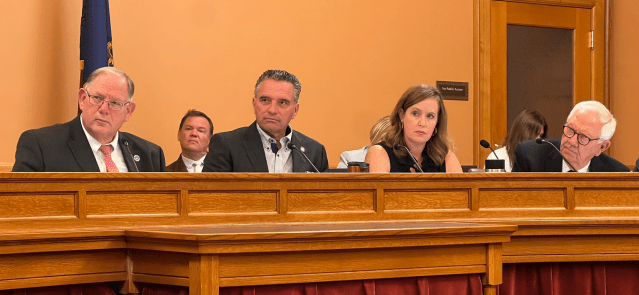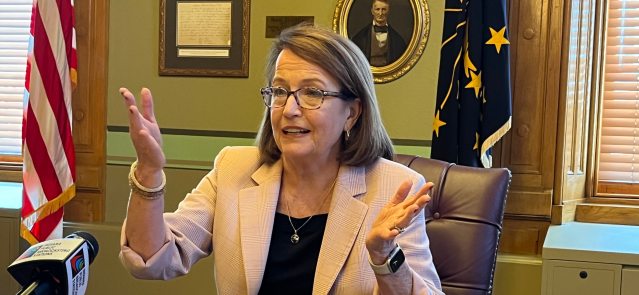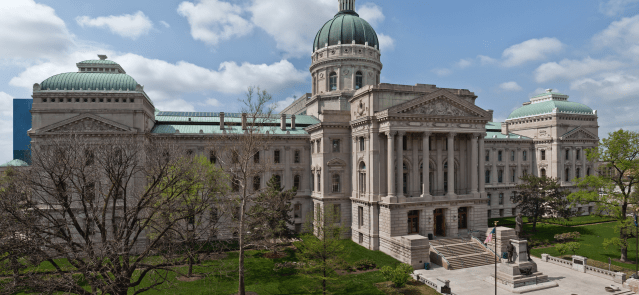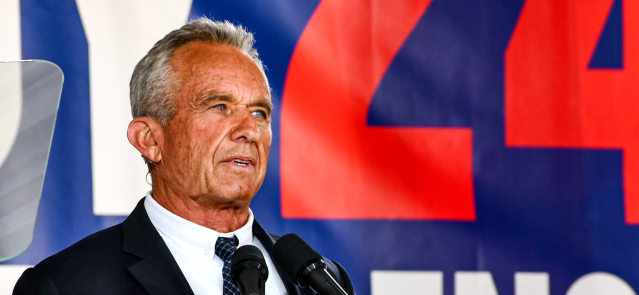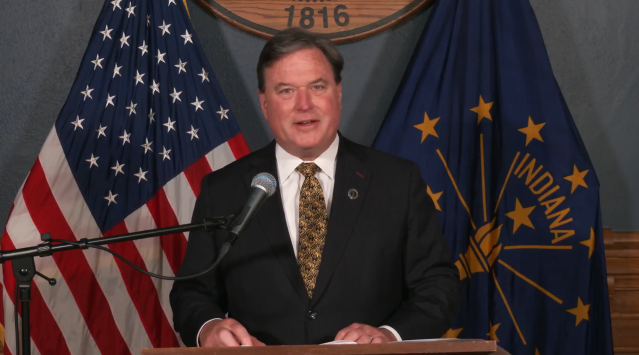Stay ahead of the curve as a political insider with deep policy analysis, daily briefings and policy-shaping tools.
Request a DemoLooking to buy a home but don’t have the down payment? Help is here
Prospective homebuyers in Georgia needing help with down payments can get an assist from the state and a major banking organization.
The Georgia Department of Community Affairs and Federal Home Loan Bank of Atlanta have teamed up to help would-be homebuyers get money from existing programs in both organizations.
The partnership enables eligible homebuyers to receive a combined grant of up to $27,500 to put toward down payments and closing costs.
Continue reading “Looking to buy a home but don’t have the down payment? Help is here”LCC OKs 7 special committees, including medical marijuana
Seven special committees, including ones on medical marijuana and affordable housing, will meet for 12 days after the Legislative Coordinating Council approved the requests Tuesday.
The interim committees represent about half the requests approved in 2023 — a non-election year — when the council allowed 14 committees to meet for 27 days.
The seven special committees are:
- Available and Affordable Housing (two days) — Discuss problems facing certain populations, lower-priced home ownership and rentals, and potential incentives
- Centralized Pooled Collateral and PMIB Modernization (two days) — Examine adding items to a list of investment options
- Foreign Trade and Regulatory Sandboxes (two days) — Review the state’s foreign trade agreements and discuss advantages and challenges of regulatory sandboxes
- Medical Marijuana (two days) — Evaluate options for comprehensive legislation
- Sedation Dentistry (one day) — Discuss availability of services for Medicaid beneficiaries
- State Employee Compensation (two days) — Review comprehensive studies by the Department of Administration on compensation
- Targeted Case Management (one day) — Provide oversight of potential changes to targeted case management of services for intellectual and developmental disabilities
Leadership from both parties will appoint legislators to the committees. The meeting dates will be determined later.
KLISS modernization
Testing started Monday on Phase 1 of the KLISS Modernization Project.
Phase 1 includes bill drafting, amendment drafting and codification systems in the update of the Kansas Legislative Information Systems and Services (KLISS) web application.
Tom Day, director of Kansas Legislative Administrative Services, said the go-live date for Phase 1 is the first day of the 2025 session.
He said the process was delayed by a month because of the preparation requirements before and after last month’s special session, which lasted a day.
Day also requested the authorization to complete the contract negotiations with Propylon, the company handling the software updates, for Phase 2 of the project.
Phase 2, which will be funded by federal American Rescue Plan Act money, covers upgrades of various functions:
- System and processes the Legislative Research Department uses
- Tools for drafting and amending budget, tax and appropriations bills
- Chamber automation tools
- Methods for accessing and tracking legislative data
Day said the contract is ready for Propylon to review and sign before it comes back for final review and the council chair’s signature. The council approved moving forward with the process.
Morrow named KLRD director
Shirley Morrow is the new director of the Kansas Legislative Research Department after the council’s approval.
Morrow has been with the department for more than 14 years and served as acting director since March 15, replacing retired Director J.G. Scott.
“We appreciate everything you’ve done up to this point,” House Speaker Dan Hawkins, R-Wichita, told Morrow. “We believe that you have done a quality job.”
Bryan Richardson is the managing editor at State Affairs Pro Kansas/Hawver’s Capitol Report. Reach him at [email protected] or on X @RichInNews.
Chief Justice Rush seeks new 5-year term as Supreme Court’s leader
Chief Justice Loretta Rush announced Tuesday she would seek another five-year term leading the Indiana Supreme Court.
Rush has led the court and the state’s Office of Judicial Administration since August 2014, when she became Indiana’s first female chief justice.
The court’s announcement said the other four justices support Rush for her third term as chief justice. The Judicial Nominating Commission is set to vote Aug. 21 on the appointment.
Rush, who turned 66 in May, said in a letter to judges and judicial branch staff she was “honored to have the support of my four hardworking partners and colleagues on the Court.”
Rush called the past 10 years “a period of remarkable evolution in Indiana’s Judicial Branch.”
“We’ve worked together to launch pretrial and problem-solving court initiatives, implement and finalize our statewide electronic filing and unified case management systems, sustain our court system through a global pandemic, overhaul our administrative agency structure, advance causes to improve access to justice for all, reshape the approach to addressing behavioral health and substance use disorders for court participants, and so much more,” Rush wrote in her letter.
She said future concerns included the state’s growing attorney shortage, the “drug crisis across our state” and “leveraging advancements like AI while guarding against cyberthreats and digital misinformation.”
The support for Rush from the other justices comes even as she has been in the minority on some significant court decisions in the past year.
They included her support for tougher sanctions against Republican Attorney General Todd Rokita over comments he made to Fox News about Dr. Caitlin Bernard after she provided an abortion to a 10-year-old Ohio rape victim.
Rush raised concerns last year about the court’s decision upholding the state’s abortion ban and joined in the dissent of a 3-2 court decision in March that blocked agribusiness executive John Rust from the Republican primary ballot for U.S. Senate.
Rush was appointed to the Supreme Court by Gov. Mitch Daniels in 2012 after 14 years as a Tippecanoe County judge in Lafayette. She won a 10-year retention vote in 2014 and again faces a statewide retention vote in the November election.
Rush told reporters in November she was undecided about seeking a new term as chief justice. She cited a workload of national and international travel to judicial conferences, oversight of statewide court system matters and the legal cases before the Supreme Court.
“It’s a pace. I’ll tell you, it’s a pace,” Rush said. “So I can’t guarantee anything on that.”
Rush was clear, however, that she has no designs on trying to match the record tenure of Randall Shepard, who was chief justice from 1987 until his 2012 retirement.
“I would never last the 25 years that Randy Shepard lasted,” Rush said.
Tom Davies is a Statehouse reporter for State Affairs Pro Indiana. Reach him at [email protected] or on X at @TomDaviesIND.
Indiana to host inaugural semiconductor event in 2025
State officials on Tuesday said Indiana will host an inaugural semiconductor event in April 2025.
SEMIEXPO in the Heartland is set for April 1 and 2 at the Indiana Convention Center. The event will be the first of its kind in the Midwest, officials said.
The event will bring together industry leaders and policymakers looking to advance the nation’s semiconductor ecosystem. Discussions on microelectronics innovation as well as “smart” manufacturing and mobility are expected as officials aim to create collaboration opportunities.
SEMI, a global industry association for companies involved in semiconductor design and manufacturing, will host the event. Gov. Eric Holcomb and SEMI Americas leaders announced Indiana’s selection for the event at SEMICON West 2024 in San Francisco on Tuesday.
“Bringing the semiconductor industry to the Midwest for this inaugural event will further showcase our advanced manufacturing leadership,” Holcomb said in a news release.
In addition, Applied Research Institute and Purdue University will host meetings in conjunction with the event, the release said.
The announcement comes as the federal government attempts to lure microchip manufacturing to the U.S., in large part through the CHIPS and Science Act of 2022, which allocated nearly $53 billion for semiconductor research and development.
Earlier this month, Indiana’s regional technology hub, Heartland BioWorks, was tapped for about $51 million from a program created by the CHIPS and Science Act.
Companies are also looking to bring microchip production to Indiana. For example, South Korean chipmaker SK hynix plans to invest more than $3.87 billion to establish a new facility in West Lafayette. The facility will create “high-intensity and AI microelectronic products and applications in Indiana,” according to the governor’s office.
Last year, Indiana was named one of two Midwestern states competing for a potential $50 billion semiconductor plant.
The state has attracted seven new semiconductor companies since 2022, according to the release.
Contact Jarred Meeks on X @jarredsmeeks or email him at [email protected].
Robert F. Kennedy Jr. campaign tops signatures needed for Indiana ballot
Robert F. Kennedy Jr. is another step closer to becoming the first independent presidential candidate on Indiana’s election ballot in over two decades.
County election officials have certified enough petition signatures from Kennedy’s presidential campaign for his name to appear on the November ballot.
The Kennedy campaign must still file the petitions with the state Election Division by July 15, but unofficial tallies submitted by county offices show the signatures of nearly 39,000 registered voters had been certified as of Tuesday morning.
State law requires at least 36,943 certified signatures for independent and minor-party candidates to qualify for the statewide ballot.
Kennedy’s campaign says it has met the requirements for his name to appear on the ballot in at least 27 other states, although not all have affirmed ballot placement. His campaign says it has an aggressive ballot access operation with a $15 million budget aimed at getting Kennedy on the ballot in all 50 states and the District of Columbia.
Kennedy is seeking to join presumptive Democratic and Republican candidates Joe Biden and Donald Trump, respectively, and Libertarian Chase Oliver on the Indiana presidential ballot.
County officials had certified about 17,000 petition signatures from Green Party candidate Jill Stein, according to Tuesday’s report from the state Election Division.
The Kennedy campaign’s national media staff didn’t reply to messages from State Affairs seeking comment on its Indiana effort.
Carlin Yoder, a former state senator who is the Trump campaign’s state director, said he had no concerns about Kennedy threatening Trump’s hold on Indiana’s electoral votes.
“This is Trump country in Indiana — our polling numbers look outstanding, with or without RFK,” Yoder told State Affairs. “Trump is going to win and he’s going to win handily here, and it doesn’t really slow us down at all to have him on the ballot.”
State Election Division officials will count the Kennedy petition signatures to ensure there are enough, said Angela Nussmeyer, the division’s co-director.
Any registered voter or Republican or Democratic county chair could challenge whether the filing meets legal requirements by Aug. 23, which would lead to a state Election Commission hearing, Nussmeyer said.
Yoder said he doubted the Trump campaign would get involved with any effort to keep Kennedy off the Indiana ballot.
“We look at everything,” Yoder said. “We want to make sure everything is done fairly and aboveboard, but I have no reason at this point to question that.”
Kennedy would be the first independent candidate to make Indiana’s statewide ballot since Patrick Buchanan’s 2000 presidential campaign.
Libertarian Party candidates have automatically qualified for the Indiana ballot since 1994, with the party’s secretary of state nominee topping the state law requirement of 2% of the vote in that race every four years.
Tom Davies is a Statehouse reporter for State Affairs Pro Indiana. Reach him at [email protected] or on X at @TomDaviesIND.
Indiana sues East Chicago over alleged ‘sanctuary city’ policy
Indiana Attorney General Todd Rokita filed a lawsuit Tuesday against the city of East Chicago over the city’s alleged refusal to rescind its “sanctuary city” policy.
Rokita cited a new state law, Senate Enrolled Act 181, which went into effect July 1, in a news release announcing the lawsuit. The new law specifies the Attorney General’s Office may bring legal action against cities the office found not to be in compliance with a 2011 law banning sanctuary cities in Indiana.
“I intend to enforce this law because illegal immigration is unfair to the good people of this state and all the immigrants who worked hard to enter our country legally,” Rokita said in a news release.
In a May 31 news release, Rokita defined a “sanctuary city” as “a local unit of government that has adopted a policy to deliberately and intentionally disregard federal law and not cooperate with federal immigration authorities.”
The lawsuit, filed in Lake County Superior Court, seeks “to compel compliance with state laws preventing local governments from limiting or restricting enforcement of federal immigration laws.”
It accuses the city of “maintaining an ordinance that restricts taking certain actions regarding information of citizenship or immigration status” and limits federal immigration law enforcement.
The state cited East Chicago Ordinance 17-0010, passed in June 2017, as the violation in question. The ordinance, the lawsuit said, restricts East Chicago agents and agencies from cooperating with federal immigration officials.
An attempt to reach the city of East Chicago for comment on the lawsuit was not immediately successful.
In May, Rokita sent letters warning three cities — East Chicago, Gary and West Lafayette — and Monroe County of alleged noncompliance with the new law.
A spokesman for Rokita’s office told State Affairs last week that West Lafayette had amended its policy, which is now compliant with state law.
In Tuesday’s news release, Rokita further warned Gary and Monroe County.
“As we continue to evaluate Gary and Monroe County, this may not be not the last lawsuit we will file on this issue,” Rokita said.
Contact Rory Appleton on X at @roryehappleton or email him at [email protected].
CURB, KCC staff call for smaller Kansas Gas Service rate increases
Two groups are calling for smaller rate increases than those requested by Kansas Gas Service.
The state’s largest natural gas utility is in the middle of a rate case. Kansas Gas Service is asking for a $58.1 million increase in net revenue — about a 9.19% increase in rates — though its proposal rankled customers at a June forum in Topeka.
The Citizens’ Utility Ratepayer Board (CURB) and staff from the Kansas Corporation Commission (KCC) submitted recommendations for the ongoing rate case, and both groups suggest smaller increases.
Commission staff members are calling for $31.7 million in additional revenue, a little more than half of Kansas Gas Service’s figure, according to testimony filed on the rate case docket.
The board, an agency that advocates for the interests of residential and small commercial utility ratepayers, believes the gas service should receive an even smaller bump: $10.8 million.
Both groups oppose Kansas Gas Service’s proposed A/B rate schedule, designed for lower- or higher-usage customers.
The change would benefit “residential consumers at the lower and upper consumption level tails,” one commission staff member wrote. “But mid-distribution customers would pay more.”
Commission staffers support keeping the current rate design but recommend an alternative A/B schedule if the commissioners prefer to switch to a rate choice system.
David Nickel, consumer counsel for the Citizens’ Utility Ratepayer Board, said the agency opposes the A/B rate proposal for similar reasons. He said the board doesn’t necessarily oppose giving customers more choices but Kansas Gas Service’s proposal isn’t the best way to go about making that change.
The next phase of the rate case begins Aug. 12 when the evidentiary hearing starts. Commissioners Andrew French, Dwight Keen and Annie Kuether will question all parties to the case, including commission staff, the board and Kansas Gas Service.
Brett Stover is a Statehouse reporter at State Affairs Pro Kansas/Hawver’s Capitol Report. Reach him at [email protected] or on X @BrettStoverKS.
Lawsuit over Tennessee’s ‘voter list maintenance program’ appears likely
The American Civil Liberties Union has put Tennessee officials on notice that it intends to sue if they don’t drop a “voter list maintenance program” inquiring about residents’ citizenship status. The ACLU said the missives to 14,375 residents violated the National Voter Registration Act.
Advocacy groups are demanding Secretary of State Tre Hargett and State Coordinator of Elections Mark Goins cease all actions that “perpetuate voter intimidation” and “violate the U.S. Constitution and federal law.” They also want issuance of a public statement that no one will be removed from Tennessee voter rolls in relation to the June 13 letters. Another element calls on the state to send a new letter to the thousands of previous recipients confirming that their voter registration won’t be purged and that they have the “right to vote as normal.”
And advocates are seeking release of all records related to the development and implementation of the voter list maintenance program.
“If these violations are not remedied forthwith, the ACLU of Tennessee and the ACLU will challenge the voter list maintenance program in court,” the letter said.
In his “notice of violation” letter to the residents, Goins wrote: “Our office has received information that appears to indicate that your voter information matches with an individual who may not have been a United States citizen at the time of obtaining a Tennessee driver license or ID card.”
Goins’ letter goes on to state: “Under Tennessee Code Annotated 2-19-107, it is illegal for an individual who is not a citizen of the United States to vote in a local, state, or federal election in Tennessee.”
His letter also notes illegal voting is a felony, carrying a potential penalty of “at least two years in jail and a fine of up to $5,000.” It adds: “We need to ensure Tennessee’s voter rolls are correct.”
Asked by The Tennessee Journal whether his letter was intended to intimidate foreign-born citizens, Goins said it was not.
“It’s not intimidation,” he said. “It’s a statement of the law. I don’t understand why they’re even saying it’s intimidation, it’s literally a restatement of the law. And it says very clearly, ‘if you’re not a U.S. citizen.’ It didn’t say if you are a U.S. citizen you’re committing a crime. It says if you are not a U.S. citizen, then you cannot vote and it is a felony to vote.”
In 2001, Tennessee lawmakers at the behest of Republican Gov. Don Sundquist’s administration authorized driver’s licenses for people who could not prove citizenship or lawful permanent residence. In 2004, the law was revised to issue certificates rather than licenses to immigrants. The program was abolished in 2006. The rationale behind the driver’s license and certificate programs was that even people in the country illegally should know the rules of the road and be able to obtain car insurance.
In his letter, Goins wrote illegal voting is a felony with a potential criminal penalty of at least two years in jail and fines of up to $5,000.
“We need to ensure Tennessee’s voter rolls are correct,” the letter reads. “If you need to correct your record, please follow these instructions,” going on to provide instructions. It asks if someone is “not a U.S. citizen, place in the envelope the completed form requesting your name be removed from the voter registration list.”
For those who say they are a U.S. citizen who have “evidence of your citizenship” as previously outlined, the letter directs them to use the prepaid non-U.S. citizens provided to them and “please place in the envelope the proof of your citizenship.”
The letter does not specifically state what happens if there is no response.
Goins spoke to the Journal following a regularly scheduled State Election Commission where the issue did not come up. Asked if his office had sent out similar letters in the past, Goins acknowledged it “was the first time that the letter has come from our office.”
Goins said the letters were going out now “because we’re within 90 days of an election.”
“And there’s a federal law that arguably prevents people from being removed from the voter rolls,” he said. “So what we sent was not a ‘purge’ letter. What we sent was a correction of the record letters.”
“But we’re getting into the content of the ACLU’s response,” Goins said in response to a reporter’s additional questions. “There’s attorneys that’s working on this and they’ll be responding to the ACLU, which is normal any time there’s some type of litigation or threat of litigation. And it looks like this is going to go to some type of litigation with the ACLU letter.”
NPR reported last week that U.S. House Republicans have filed legislation to require proof of U.S. citizenship for voter registration in federal elections. The article noted about one in 10 adult citizens — or 21.3 million eligible voters — say they either don’t have or could not readily find and quickly show their U.S. birth certificate, passport, naturalization certificate or certificate of citizenship.
While that could pass the GOP-controlled House, it’s likely doomed in the Senate, which is under Democratic control.
The American Civil Liberties Union Foundation of Tennessee and American Civil Liberties Union Foundation sent its objections to the election letter on behalf of the following groups: the American Muslim Advisory Council of Tennessee, Civic TN, Conexión Americas, the Nashville Branch of the NAACP, Organize TN, Tennessee Immigrant & Refugee Rights Coalition, Tennessee Justice for Our Neighbors, League of Women Voters Tennessee Chapter and individual voters who received the state’s June 13 correspondence.


